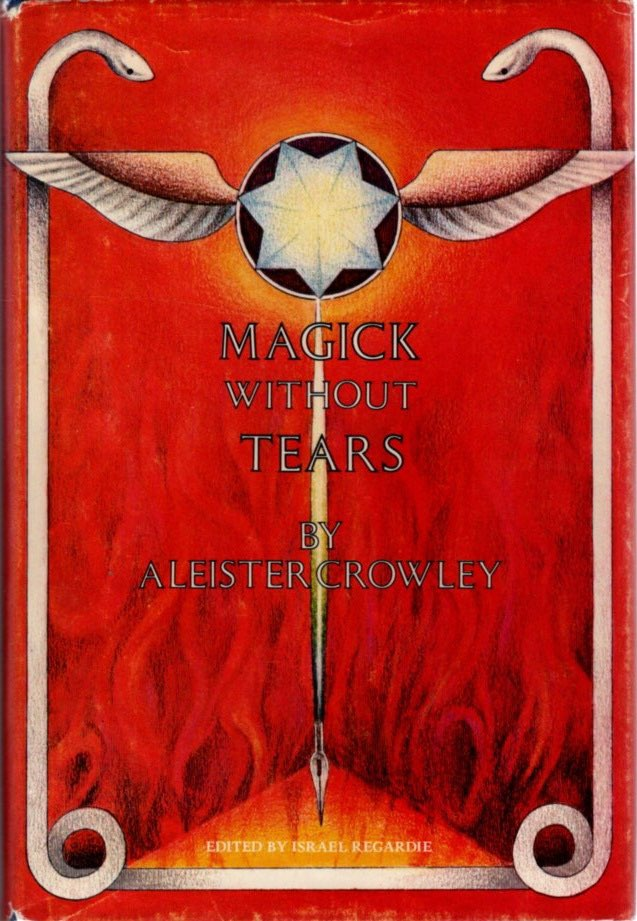Magick Without Tears Chapter 3 Hieroglyphics Life and Language Necessarily Symbolic

Author: Aleister Crowley Publisher: St. Paul, MN: Llewellyn Publications. Publish Date: 1954 Review Date: Status:💥
Annotations
45❗️
Let me set out by restating our original problem; what we want is Truth; we want an even closer approach to Reality; and we want to discover and discuss the proper means of achieving this object. Very good; let us start by the simplest of all possible enquiries-and the most difficult-”What is anything?” “What do we know?” and other questions that spring naturally from these.
I see a tree. I hear it-rustling or creaking in the wind. I touch it-hard. I smell it-acrid. I taste it-bitter.
Now all the information given by these five senses has to be put together, although no two agree in any sort of way. The logic by which we build up our complex idea of a tree has more holes than a sponge.
45❗️
But this is to jump far ahead: we must first analyze the single, simple impression. “I see a tree.” This phenomenon is what is called a “point-event.” It is the coming together of the two, the seer and the seen. It is single and simple; yet we cannot conceive of either of them as anything but complex. And the Point-Event tells us nothing whatever about either; both, as Herbert Spencer and God-knows-how-many others have shown, unknowable; it stands by itself, alone and aloof. It has happened; it is undeniably Reality. Yet we cannot confirm it; for it can never happen again precisely the same. What is even more bewildering is that since it takes time for the eye to convey an impression to the consciousness (it may alter in 1,000 ways in the process!) all that really exists is a memory of the Point-Event, not the Point-Event itself. What then is this Reality of which we are so sure? Obviously, it has not got a name, since it never happened before, or can happen again! To discuss it at all we must invent a name, and this name (like all names) cannot possibly be anything more than a symbol
46❗️
Even so, as so often pointed out, all we do is to “record the behaviour of our instruments.” Nor are we much better off when we’ve done it; for our symbol, referring as it does to a phenomenon unique in itself, and not to be apprehended by another, can mean nothing to one’s neighbours. What happens, of course, is that similar, though not identical, Point-Events happen to many of us, and so we are able to construct a symbolic language. My memory of the mysterious Reality resembles yours sufficiently to induce us to agree that both belong to the same class.
46❗️
But let me furthermore ask you to reflect on the formation of language itself. Except in the case of onomatopoeic words and a few others, there is no logical connection between a thing and the sound of our name for it. “Bow-wow” is a more rational name than dog, which is a mere convention agreed on by the English, while other nations prefer chien, hund, cane, kalb, kutta, and so on. All symbols, you see, my dear child, and it’s no good your kicking!
46❗️
But it doesn’t stop there. When we try to convey thought by writing, we are bound to sit down solidly, and construct a holy Qabalah out of nothing. Why would a curve open to the right, sound like the ocean, open at the top, like you? And all these arbitrary symbolic letters are combined by just as symbolic and arbitrary devices to take on conventional meanings, these words again combined into phrases by no less high-handed a procedure
47❗️
And then folk wonder how it is that there should be error and misunderstanding in the transmission of thought from one person to another! Rather regard it as a miraculous intervention of Providence when even one of even the simplest ideas “gets across.” Now then, this being so, it is evidently good sense to construct one’s own alphabet, with one’s own very precise definitions, in order to handle an abstruse and technical subject like Magick. The “ordinary” words such as God, self, soul, spirit and the rest have been used so many thousand times in so many thousand ways, usually by writers who knew not, or cared not for the necessity of definition that to use them to-day in any scientific essay is almost ludicrous.